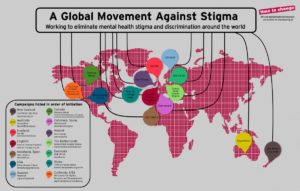From Psychologists for Social Change: “When policies, like the roll-out of Universal Credit, that have been linked to suicide show no sign of being scrapped, how have we not noticed? Why is there not a bigger uproar about the impact of austerity? Do we simply need more journalism or is there something else at play? I believe that the dominant anti-stigma campaigns also have a role to play here. After all, who wants to be critical of Jane Doe telling her story to inspire or comfort others? Who wants to be critical of someone who calls out the use of vulgar language? Surely these can only be Good Things. But since the things that these campaigns ask of us are easy to do and feel good, they can easily swallow energy, time and money. This leaves little resources or public appetite to tackle anything harder that might actually make life better for swathes of people.
Furthermore, it is no coincidence that the impact of anti-stigma campaigns is almost impossible to measure or that they rarely include those who have the most stigmatised diagnoses like psychosis and personality disorders, who often experience abuse in secure settings.
The real purveyors of stigma
If our current obsession with tackling interpersonal stigma is a convenient distraction, what or who should anti-stigma efforts focus on? Who is to blame for creating a society where these more visible aspects of stigma are permissible? It is the same mental health services that enforce a ‘medical model’ that dictates that experiences of mental distress can be grouped into separate categories like physical diseases and are just symptoms of ‘chemical imbalances’ in the brain. There is mounting evidence pointing the finger.”












